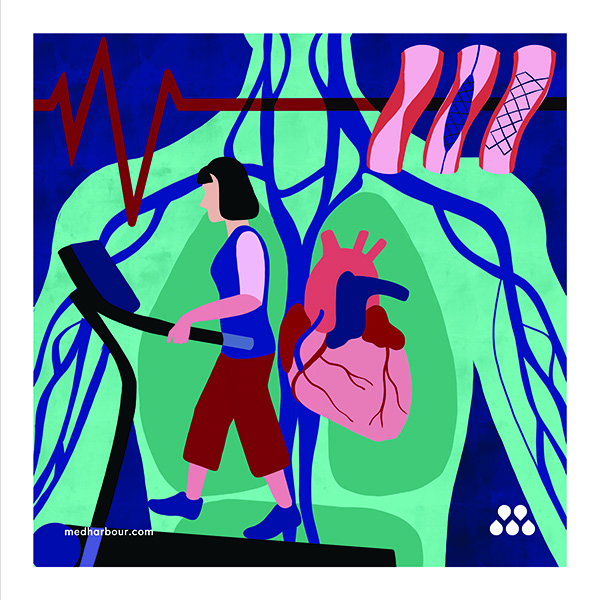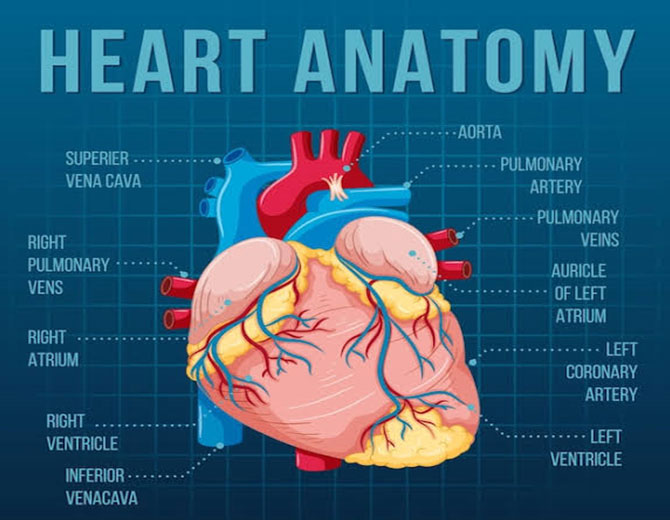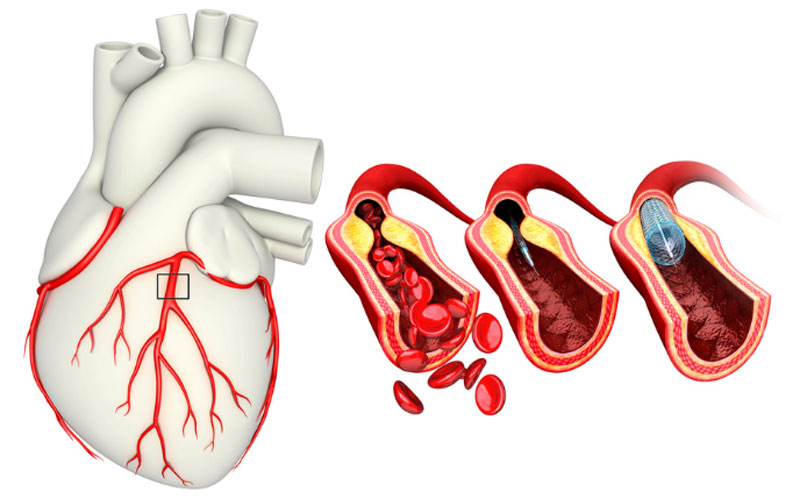
The cardiovascular system – heart ,blood and blood vessels
How does the cardiovascular system work ? – the anatomy of the heart. The cardiovascular system consists of the circulatory system that circulates blood . The cardiovascular system combined with the lymphatic system makes up the circulatory system.
The cardiovascular system and circulatory system is often used interchangeably to describe circulation of the blood. The cardiovascular system consists of the heart, blood and blood vessels.The heart has two sides and each side has two chambers namely right atrium,left atrium, right ventricle and left ventricle.The primary function being the transport of gases – oxygen to the body tissues and transport of Carbon dioxide back to the lungs. There are 4 valves that ensure blood flow to the heart namely , aortic valve, tricuspid valve, pulmonary valve and mitral valve . The cardiac cycle consists of two phases.The first phase is diastole, in which the ventricles fill with blood.The second phase is systole, in which the ventricles contract and eject blood.Deoxygenated blood flows from right atrium to right ventricle and from there it goes into pulmonary artery while oxygenated blood flows from left atrium to left ventricle and then to aorta which supplies it further .The arteries carry blood away from the heart; the veins carry it back to the heart.The heart is enclosed in a double layered protective sac called pericardium. The heart also helps in transport of waste and nutrients-the valuable nutrients as recovered by the digestive system gets stored in the small intestine and then transferred to the liver for further removal of toxins and then transferred to the bloodstream. The metabolic waste is then transferred by the body tissues to the kidney and comes out of your body in the form of poop.The other functions of the cardiovascular system is transport of hormones from the endocrine glands to the organs and performs immune defence function .The blood contains plasma , red blood cells, white blood cells and platelets.The red blood cells transports oxygen and carbon dioxide, the white blood cells prevents and fights foreign organisms and the platelets help in building clots during an injury.
Common diseases of the cardiovascular system

Abnormalities or injuries to any or all parts of the cardiovascular system can result in serious health complications. Cardiovascular diseases can be severe and potentially life threatening.
Some of the common cardiovascular diseases treated at Medharbour, Gurgaon are :
Heart attack:A heart attack happens when any part of the heart muscle doesn’t receive enough blood. This can happen due to a blockage, oxygen deficit or a tear in the artery surrounding the heart .
Stroke:A restricted blood supply to the brain is named stroke which causes death of brain cells .There are two types of strokes: Ischemic stroke that occurs as a result of a blood clot blocking blood flow to the brain. Hemorrhagic stroke that occurs as a result of a bleed in or around the brain.
Heart failure:Inability of the heart to supply enough blood to the body and it’s organs resulting in lack of internal functioning is termed as a heart failure.
Arrhythmia:An arrhythmia is an abnormal heart rhythm. It may present as a heartbeat that is too quick, too slow or has a distinct pattern .For life threatening arrhythmias, doctors may insert a device called pacemaker .
Angina : a type of chest pain that occurs due to decreased blood flow into the heart
arrhythmia, or an irregular heartbeat or heart rhythm.
Congenital heart disease: problem with the functioning of the heart or in the heart anatomy since birth is termed as congenital heart disease.
Coronary artery disease: it affects the arteries that supply blood to the heart muscles and happens when the heart cannot contract or relax normally.
Dilated cardiomyopathy: A type of heart failure, in which the heart gets larger than its usual size and cannot pump blood efficiently.
Hypertrophic cardiomyopathy: In this disease,the heart muscle walls thickens and problems with relaxation of the muscle and blood flow develops.
Mitral regurgitation:In this situation the blood is pushed back to the mitral valve of the heart during contraction.
Mitral valve prolapse: In this ,a part of the mitral valve bulges into the left atrium of the heart when it contracts, causing mitral regurgitation.
Pulmonary stenosis:Here, narrowing of the pulmonary artery reduces blood flow from the right ventricle to the pulmonary artery.
Atrial fibrillation: an irregular rhythm that can increase the risk of stroke.
It’s a complication that causes inflammation in the heart and can affect the function of heart valves.
Radiation heart disease: wherein radiation to the chest can lead to damage to the heart valves and blood vessels
Aneurysm, a bulge or enlargement in an artery in which plaque forms along the walls of blood vessels, narrowing them and restricting the flow of oxygen rich blood.
Renal artery disease: It affects the flow of oxygenated blood to the kidney and deoxygenated blood from the kidneys causing a buildup of metabolic waste within the blood .
Peripheral venous disease: this complication is a general damage in the veins that transport blood from the feet and arms back to the heart.
Blood clotting disorders, in which blood clots form too quickly or not quickly enough and lead to excessive bleeding or clotting during an injury the cause of which is a blood platelet. Buerger’s disease: This disease is the main cause of gangrene as it leads to blood clots and inflammation, often in the legs.
- Shortness of breath
- Pain in the chest that extends to hands and back (usually left )
- Confusion and blurriness
- Pain and stiffness in neck, jaw, throat
- Pain, numbness, weakness or coldness in the legs or arms
- Sweating
- Palpitations
- Coughing or wheezing
- Swelling in legs , ankle or feet
- Lightheadedness
- Nausea and fatigue
Most commonly seen symptoms of cardiovascular diseases :

This list includes some of the most common symptoms of heart or cardiovascular complications. However, this list is not exhaustive and there can be other symptoms too which shouldn’t be ignored in case of slightest doubt as cardiovascular diseases can be fatal,life threatening and are leading cause of morbidity in India post COVID.
Treatment of cardiovascular diseases
Angioplasty and stents Angioplasty is a treatment that uses stents to improve blood flow to the heart by opening a narrowed or blocked coronary artery.A stent is a metal tube that is inserted into the narrowed artery enriched with a medicated formula that keeps releasing in the surrounding area thereby preventing any blockage in the future. The stent is an artificial frame which keeps pushing against the artery wall.
Coronary artery bypass graft surgery
A blood vessel is inserted between the aorta and the coronary artery/arteries leading to the heart muscle. This allows the blood to bypass blocked arteries and restores blood flow to the heart muscle.When 2 grafts are used it’s called double bypass, when 3 grafts are used it’s triple bypass and in case of 4 grafts it’s quadruple bypass, all of which is very common.
Heart valve surgery
There are three common types of heart valve procedures: Open heart surgery to repair or replace a valve.
Valvuloplasty (using a balloon to widen a narrowed heart valve).
Transcatheter aortic valve implantation (TAVI)
Pacemaker
A pacemaker is used to correct slow or irregular heartbeats called arrhythmias.Pacemakers are made up of a battery and an electronic circuit in a metal case .The pacemaker is connected to your heart muscle by one or two leads.
Implantable cardioverter defibrillator (ICD)
You need to have an ICD introduced into your heart when you are at a higher risk of heart attack ( cardiac arrest) or had one .
An ICD (implantable cardioverter defibrillator) is a small device that helps keep your heart beating with stability.
Appointment with the best cardiologist at Medharbour, Gurgaon
At Medharbour, we have the best cardiologist near you , in the aesthetic space of Gurgaon .Our doctors understand the sensitivity and seriousness of heart complications and will strive best to cure all possible ailments. Only the most experienced and well qualified doctors treat you at our hospital.
Have any symptoms of heart/ cardiovascular complications? Book an appointment with us today !
Our Services
- Spine
- Shoulder Elbow Wrist
- Knee & Hip
- Foot & Ankle
- Sports Injuries
- Pain Management
- Neuro Rehab
- Interventional Neurology
- Residential Care
- Breast Rehab
- Gastroentrology
- Nephrology
- Radiology
- Pathology
- Cardiovascular Treatments
- Geriatric Rehab
- General Medicine
- Diabetes Care
- Gynaecology
- Pulmonary Rehab
- ENT
- Shoulder Elbow Wrist
- Ayurveda & Naturopathy
- Cancer Care
- Plastic Surgeries
- Dental Care
- Yoga
- Psychology
- Dermatology
- Hair Transplant
- Wellness Fitness
